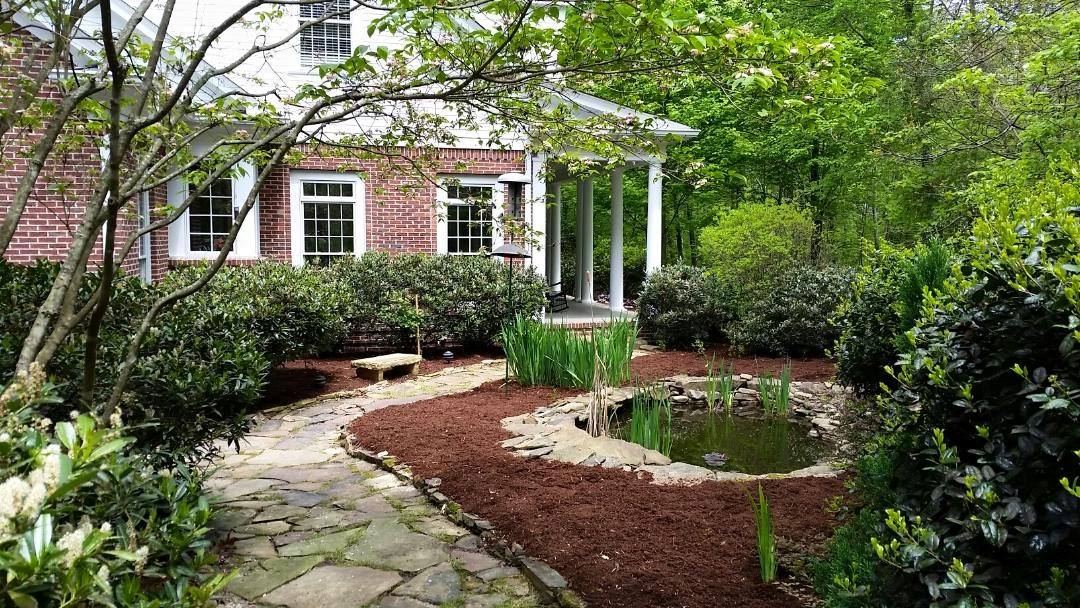Each season presents a unique set of challenges in the landscape. The late summer weather of July is no exception. The task of protecting your landscape from extreme heat, severe weather, and various pests can be an arduous one. Here at Holder Outdoor, we wanted to provide some landscaping tips to help you keep your yard thriving in the intense heat and unpredictable weather that is summer in the Chattanooga area.
July weather in the south is hot and humid. This leads to a significant spike in insect populations and fungal diseases. We highly recommend that you are diligent in your pest prevention methods during summer. Monitor your lawn and landscape plants regularly for signs of any diseases or infestation. Identify the pest or pathogen responsible, then research the best method for eradicating that particular insect or fungus. Fungicides and Pesticides usually have very specific labeling and tend to be targeted for a very specific pathogen or insect. If you plan to spray yourself, it is critical that you obtain a product labeled for use on the specific threat you intend to target. It is also imperative that you read the instructions for use carefully, and follow all manufacturer recommendations for protective equipment. Generally, late evening is considered to be the best time to spray during the hot summer season. At Holder Outdoor, we can help with all common lawn and landscape pest and fungus issues.
Mow and water your lawn and landscape on a regular basis, but don’t over water. If you have sprinklers, or other irrigation, consider installing a rainfall sensor so that your system recognizes the amount of rainfall your landscape is receiving from thunderstorms and rain showers. This simple sensor will prevent the system from engaging when the grass has already received adequate water, and prevent over-watering. If you don’t have sprinklers, or irrigation, then you want to remain aware of the amount of water being lost to evaporation and runoff. You should water once or twice a day if there is no rain. You definitely want to keep your lawn mowed but also avoid over mowing. Grass tends to grow quickly in the summertime, but you never want to be cutting more than 1/3 the height of the grass. Mowing grass too short can lead to stress on the roots, dehydration, and discoloration.
It is recommended that you continually deadhead your annual and perennial flowers so they can rebloom later on in the season. You can also pluck the top buds of several popular flowering plant species to limit seed development, which results in the plant blooming more. If you have questions, Holder Outdoor can help.
Be aware that poison ivy is an issue. This poisonous and invasive plant is constantly finding its way into Chattanooga area gardens, yards, and landscapes. You can identify this noxious pest by its signature look-three pointed leaflets per leaf. If you see poison ivy, do not touch it directly! Poison Ivy can be controlled by pulling it up using gloves or yard tools, as well as brush killing products. Follow all manufacturer label instructions when using brush killer. For those brush clean up jobs, contact Holder Outdoor to get the job done!
Fertilize your vegetable and herb plants with a nitrogen rich fertilizer about once per month in the summertime. This will keep your garden plants strong and healthy. We do not recommend using fertilizer on dry soils. It is preferred to wait until after a rainstorm or irrigation has watered your garden to apply fertilizer. The summer months are also a good time to prune trees and shrubs. You can be thorough with this process, but limit your pruning to removing less than 15% of the leaves of a plant if you want the plant to remain healthy. The first priority is any branches that are already dead, or appear to be dying. Call Holder Outdoor for assistance with this and other summer projects!
Remember to harvest your herbs, fruits, and vegetables. July is peak season for all sorts of critters that would love to take your freshly ripened produce. Birds, deer, rabbits, and insects can all steal or destroy your crops before you get to enjoy the fruits of your labor. Check your garden every day and harvest as soon as your crops reach sufficient ripeness to pick.
Get ready for fall by planting fall vegetables such as lettuce, broccoli, carrots, turnips, and radishes. These can all be planted now for maximum enjoyment when autumn rolls around. It’s nice to have something to look forward to, and our long growing season here in the south affords us that luxury.
For assistance with all of the above, and much more, contact Holder Outdoor today!





